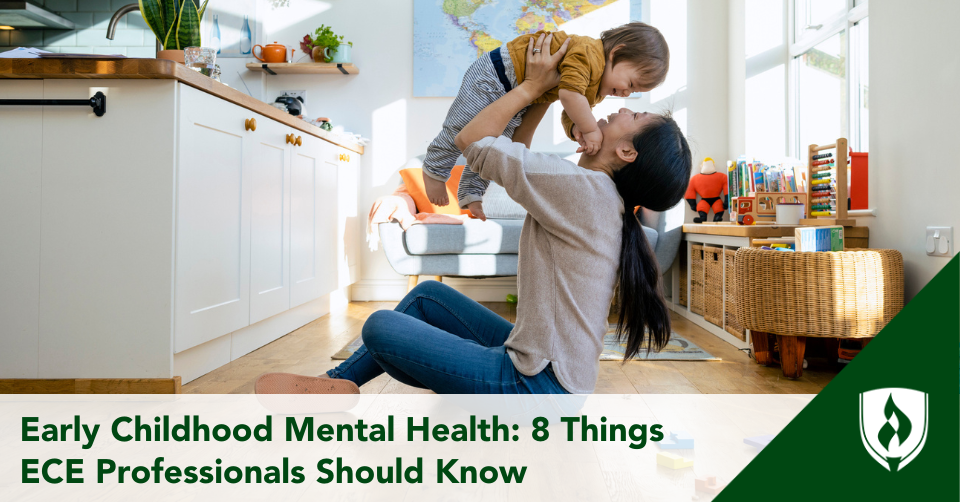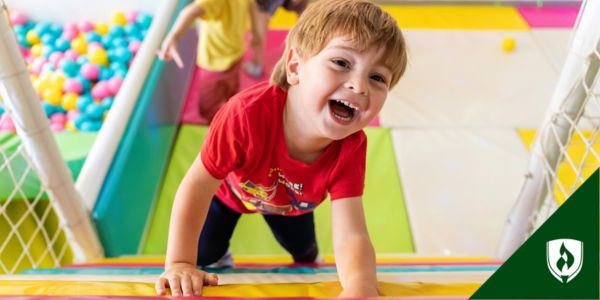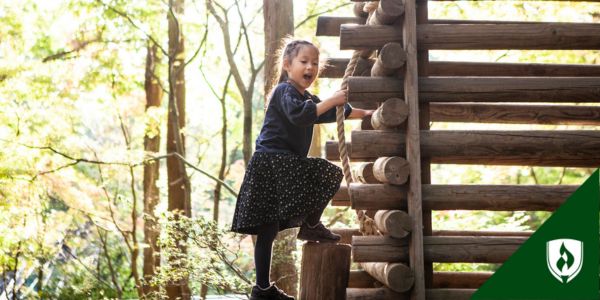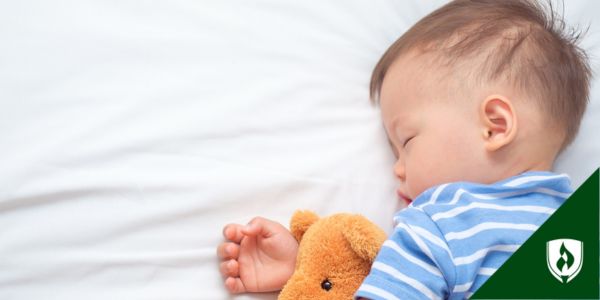
Picture this: You've finally finished turning your living room into a lovely little daycare area, and now it's suddenly filled with bright-eyed, curious souls—each one a world of endless possibility. And they're all looking at you to ignite their journey. You're not only the green light and the spark plug, but also the paved road guiding their exploration.
This is early childhood education, where your influence can help shape the future.
But there's a secret to truly unleashing their potential—understanding early childhood development and early childhood mental health.
Read on to see what an early childhood educator (ECE) should know about children's mental health, so you can use these insights to your – and your kids' – advantage.
Whether you're already walking the path of an early childhood educator or just contemplating this journey, dig into a deeper connection with the hearts and minds of your youngest learners.
What exactly is early childhood mental health?
Early childhood mental health refers to the psychological, emotional and social well-being of young children (birth to age five).1
It encompasses the developing mental and emotional capacities of infants, toddlers and preschool-aged children. Early childhood mental health is a fundamental component of overall well-being, as it lays the foundation for a child's future emotional and psychological health.1
Why is early childhood mental health important?
Early childhood mental health services are of paramount importance due to their role in helping to provide a head start for lifelong well-being. During this critical period of brain development of a child, positive (and negative) early experiences can significantly impact their emotional development and psychological health.2
These formative years are when children begin to cultivate vital social and emotional skills like empathy, self-regulation and effective communication, which are pivotal for building positive relationships and school readiness/academic success.2
The U.S. Department of Health and Human Services writes that a child's first eight years are critical for substance abuse prevention, stating that some early childhood interventions can largely prevent substance use.3 They also say that while they recognize "substance use generally begins during the teen years, it has known biological, psychological, social and environmental roots that begin even before birth."3
By intervening early and supporting mental health in young children, it is possible to identify and address concerns before they escalate, potentially reducing the risk of challenging behaviors or mental health problems in adulthood.
8 Things every early childhood educator should know about early childhood mental health
As an early childcare provider, understanding and supporting the mental health of toddlers to preschool-age children is vital for their overall well-being.
1. Know what their developmental milestones are
Familiarize yourself with key milestones for children in your care.
"In the initial six years, kids achieve cognitive feats like grasping object permanence, engaging in pretend play and tackling simple problems,” says Michelle Giordano, community counselor and outreach specialist for Live Another Day.
"Socially, they form close bonds, participate in side-by-side play and initiate friendships. Emotionally, they start recognizing and expressing basic feelings, eventually developing empathy, guilt and shame."
2. Understand the weight of attachment
Understand the significance of attachment in early childhood. Attachment can come in several "styles," such as secure, anxious-ambivalent and avoidant, based on how children interact with their caregivers.4 These early attachments can profoundly influence a person's emotional well-being and relationships throughout their life.
"Early attachment shapes a child's mental health foundation. Secure attachments foster emotional resilience, self-esteem and healthy relationship patterns," says Bharat Jindal, M.D. and consultant pathologist.
3. Teach and model emotional regulation skills
Know that toddlers and preschoolers are learning to manage their emotions. ECE instructors can help by teaching coping strategies like taking deep breaths or using " feelings words" to express themselves.5
"Young children could face difficulties identifying intricate emotions and managing intense feelings," says Giordano. "Things like tantrums, withdrawal or outbursts are common reactions to emotional overload."
4. Supporting their social skills can make a huge difference
Support children in developing social skills by encouraging sharing, cooperation and problem-solving during playtime.
Through these interactions, children not only learn to collaborate and navigate social dynamics but also develop empathy and a sense of community, which are essential for their overall social and emotional growth.
Friendships and a good understanding of social interactions will also help children immensely throughout their lives, building a strong, pro-social foundation.
5. Look them in the eye and listen
Practice active listening when children talk or express themselves. This validates their emotions and helps them feel understood.
When children see the adults in their lives brush their feelings aside, they can internalize the message that their feelings are not important—or even worse, are something to be ashamed of. Since emotions aren’t something humans grow out of, this does them a disservice in the long run.
6. Monitor red flag behaviors
Be aware of behavioral "red flags," such as extreme aggression, persistent withdrawal or sudden and severe changes in a child’s behavior. These may warrant professional evaluation.
If a child consistently displays these symptoms, Giordano suggests that "seeking assistance from a mental health professional can be advantageous... Pediatricians, child psychologists and early childhood programs extend support. Parenting classes, support groups and online resources are also accessible."
As an educator, caregiver or ECE expert, you should never diagnose a child or correlate their behavior with a disorder—rather, note the red flags to the child’s family and work with them to find a resource qualified to evaluate.
7. Encourage positive emotional expression
Create a safe and open environment where children feel comfortable expressing their feelings, whether it's joy, anger or sadness.
Designating spaces like “quiet zones” or “calm down corners” can be a great way to help children when they are overstimulated or overwhelmed. Emotion naming charts are a great resource as well, since you can ask kids to point to the one they feel. Use art, playacting and stories to further demonstrate healthy emotional expression.
8. Collaborate with parents/guardians
You know it takes a village to raise a child. Isolation often works against positive mental health outcomes—and this goes for a child’s families and caretakers too. Bring those loved ones into collaboration with you.
Create open communication with families, parents or guardians. They can provide valuable insights into a child's emotional well-being and any challenges they may be facing at home. You might even be able to teach them about age-appropriate responses to behaviors and help reassure them about what is normal at their child’s age.
What can ECE providers do to encourage mental health in children?
To support this essential aspect of child development, ECE providers can implement several effective strategies to encourage a child's well-being and mental health.
On top of these tips, modeling positive behavior is key. Even infants soak up the behavior of the people around them. If they see you stuff your feelings or react in anger against your coworkers, that reinforces those behaviors.
If they see you demonstrate empathy, active listening and conflict resolution skills, they will be more likely to emulate those behaviors.
Ready to unlock your potential and help shape the future?
With this valuable knowledge about early childhood mental health, it's important to remember that ECE educators really do have a pivotal role in the development of young minds.
Understanding the nuances of emotional health in toddlers to preschoolers equips you to make a lasting impact on their lives.
With every interaction, each encouraging word, thought-out lesson plan and supportive environment, you are laying the cornerstone for their future success and emotional resilience.
If you'd like to learn more about the impact you can have as an educator, read our article "5 Reasons Why the Importance of ECE Is Impossible to Ignore."
Rasmussen University ECE programs do not prepare students for licensed teaching positions in any public school setting. However, students will have the opportunity to help shape the futures of young children from birth to age six in a childcare and non-public school setting or leadership role.
1U.S. Department of Health & Human Services. Center of Disease Control. What Is Children’s Mental Health? (Date accessed 9/2/23). https://www.cdc.gov/children-mental-health/about/
2Center on the Developing Child. Harvard University. Deep Dives Early Childhood Mental Health. (Date accessed 9/2/23). https://developingchild.harvard.edu/science/deep-dives/mental-health/
3National Institutes of Health. News Releases. A child’s first eight years critical for substance abuse prevention. (Date accessed 9/2/23). https://www.nih.gov/news-events/news-releases/childs-first-eight-years-critical-substance-abuse-prevention
4R Lewis. Healthline.com. Types of Attachment Styles and What They Mean. (Date accessed 9/2/23). https://www.healthline.com/health/parenting/types-of-attachment
5A Morin. VeryWellFamily.com. List of Feeling Words From A to Z. (Date accessed 9/2/23). https://www.verywellfamily.com/feelings-words-from-a-to-z-2086647




